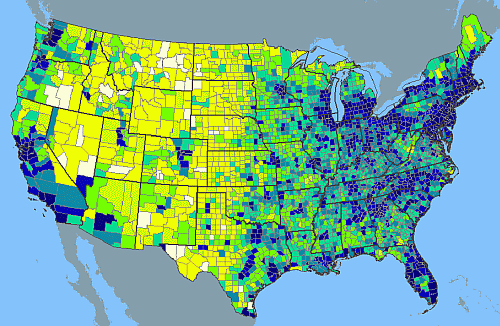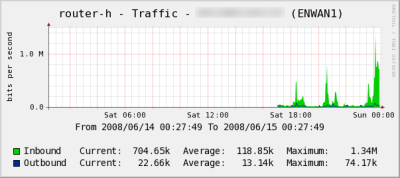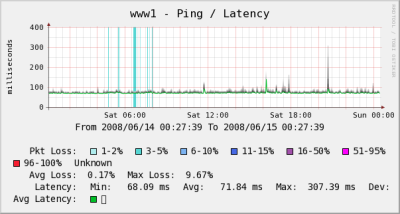The Boston Globe has some amazing photos from the 2008 Midwest floods. Particularly impressive is that first one with the nearby tornado.
Month: June 2008
Elmo Numa Numa
This is disturbing enough to keep me awake for some time, yet still funny.
Edit: Elmo and Andrea Bocelli and Elmo and Robert DeNiro are just slightly less wierd.
Firefox 3.0 Is Out
So the servers had a giant melt down. That’s hopefully history now. It’s out! Go download it. While your at it, spread the word and help break a world record. After all, how many world records have you participated in so far?
- Awesomebar – Find what you want easier than ever.
- Malware Protection – Stay safer when browsing the web
- Native UI Appearance – It looks better than ever.
- Better Addons/Plugins Manager – Manage plugins with ease, find new addons.
- Download Manager – Resumable downloads!
- Smart Bookmarks – Most visited, recently bookmarked, recently tagged.
- Better Memory Management – Nuff said
- Powered By Robots Not only are they awesome, they obey the Three Laws of Robotics
See Deb Richardson’s Field Guide to Firefox 3 for more details.
Only Hours Left
Something tells me that at about 10:00 PST / 1:00 EST something big will be happening.
I sure hope someone is interested 😉 .
The FCC for years has been considering any connection greater than 200kbps to be broadband. For the past several years that’s been pretty misleading. In addition, they only collect downstream, not upstream. They also consider an entire zip code to have broadband if only 1 home can get it. That’s not very accurate. This makes the broadband situation in the US look better than it really is.
The definition of broadband in the US is now being redefined as 768kbps. They will now collect upstream data, and use census-track data. This is a major win since it will more accurately show how many people really do have broadband, and more importantly how many do not.
I personally disagree on the number and think it should be at least 2Mbps, but it’s a win regardless.
The pacific rim annihilates the United States when it comes to broadband. According to Akamai’s State Of The Internet for Q1 2008 high broadband (greater than 5Mbps) is where we really start to show our deficiencies. Here’s a look at broadband which they define as simply greater than 2Mbps:
| Rank | Country | % >2Mbps | Q4 07 Change |
|---|---|---|---|
| Global | 55% | -2.0% | |
| 1 | South Korea | 93% | -1.5% |
| 2 | Belgium | 90% | +1.5% |
| 3 | Switzerland | 89% | +0.5% |
| 4 | Hong Kong | 87% | -1.5% |
| 5 | Japan | 87% | +1.0% |
| 6 | Norway | 83% | -2.3% |
| 7 | Tunisia | 82% | +29% |
| 8 | Slovakia | 81% | +0.5% |
| 9 | Netherlands | 78% | -2.6% |
| 10 | Bahamas | 74% | -3.0% |
| … | … | … | … |
| 24 | United States | 62% | -2.8% |
Pretty pathetic considering our last Vice President invented the Internet 😉 . We are the largest in terms of sq miles, but when you consider the US population density, the bulk of our land is very sparsely populated. 80.8% of the US population lives in an urban setting [Warning: PDF].

Japan by comparison has 66.0% of it’s population in an urban setting. Belgium has a surprising 91.5% which may account for it’s #2 position. Switzerland has 44.4% yet makes 3rd place threatening Belgium’s position.
I’m far from the first one to complain about the poor state of broadband. BusinessWeek and CNet both have relatively good discussions about the topic.
The future of media is clearly moving online as people demand to consume it on their schedule as they desire. Take a look at some of the statistics and it’s clearly a large industry. I suspect the lack of broadband infrastructure will be a real problem in the next several years as the rest of the world becomes very easy to distribute media to, and the US still faces challenges.
Solution? Highly debatable, but if so many other countries can do something about it, I suspect it’s achievable here in the US as well. I suspect that the taxes made from companies that do business on the internet from ecommerce to advertising would make this a decent investment for the US government to at least partially back. The more places companies make money, the more places the government does. That may be necessary as not all markets are profitable enough for telco’s to bother with. There have been various attempts to jumpstart this effort, but none to date have been successful.
It’s not only about just having access, it’s also the cost. As BusinessWeek points out in the article above, broadband in the US is not cheap.
Perhaps wireless will finally allow for competition and lower prices, at least that’s what everyone is hoping for. The question is if it will happen, if the technology will be there (wireless is generally high latency), and if it will be affordable for the common man.
I suspect in the next 4 years this will become and even bigger topic of discussion as some of the top ranking countries start to reach the point of saturation.
John Resig has an interesting blog post on embedded JavaScript. It’s something I’ve been thinking about for a little while.
It would be awesome to see a PHP extension to embed SpiderMonkey into PHP. As far as I’m aware Facebook is the only one that’s taken a step in that direction with FBJS, which uses Mozilla source code. Perhaps that could be a starting point.
Considering the ubiquity of JavaScript, using SpiderMonkey, which is already available for Perl and Python, or Rhino (for Java) would make sense. It would allow for JavaScript to be for logic what XML is for data. In my mind that is nirvana for the web.
XML made our data portable. JavaScript can make our logic portable. Seems practical enough right?
For those who question security, it’s really up to the client to decide if it should parse JS, and what subset it should allow (perhaps no eval()). Having an API based on JS is really no less secure than any other language including one that’s home made. It’s advantage is that it’s used everywhere else and makes your API easier to work with.
This could be cornerstone of Web 3.0. Web 2.0 was largely about shared data and isolated small services. Web 3.0 could be about shared data and shared services.
Goodbye MRTG
I’ve finally got just about all the network graphs I maintain using RRDtool rather than MRTG. I started doing this since MRTG isn’t good for graphing things with more than 2 sets of numbers. I started doing this because I wanted to track cable modem data. I figured while I’m at it, I should move other stuff too.
So much easier to read, and so much faster since your not spitting out graphics files every time the system polls. Not to mention the quality of the graphing image is much nicer. These are shrunk a little and they still look great.


MRTG is still running, but I think I’ll shut it down as soon as I can verify things are working the way I want.
The $500 Ethernet Cable
I’ve seen this in several sites over the past few days. Apparently Denon decided to put out a $500 Ethernet Cable (AK-DL1). Free shipping via Amazon. I’ll give you few minutes to laugh.
Hopefully your now under control. As pointed out in various places like Slashdot and all the links in the paragraph above, the only thing possibly unique to this cable is a thin piece of foil. Considering it’s use, that likely has no material difference. Someone will still purchase it despite a variety of cables that are almost unquestionably of equal or greater quality and cost less than 1% of that one.
I’m convinced cabling is the biggest scam in the electronics industry today. It amazes me that the “pros” use $5-$25 generic cables while the novices spend hundreds on gold plated, shielded, USB, speaker, ethernet cables. For some reason USB seem to be the most abused (though never to the $500 level). HDMI is expensive to begin with, so while it’s still abused, percentage wise it doesn’t seem to be to the same degree. Not exactly sure why, but even SCSI was never subjected to this level of price variation.
This reminds me of the coat hanger cable experiment a little while back (among others). A modern classic.
It’s a sad state of affairs that you can’t just walk into a store and by a reasonably priced good quality cable these days.
A few months ago I ordered a USB cable where shipping cost more than the product. Still cheaper than going to the store. I should add that cable works perfectly. It’s actually better than anything I could get at a store since it didn’t come in one of those plastic packages that cut you when you open it (which should be outlawed by the way). Just a sealed plastic bag with a sticker on it.
USB, HDMI, speaker cables might be overpriced, but it’s nothing compared to the $500 Ethernet cable.
Edit [6/20/2008]: Network World has a nice rundown of it.
The Daily WTF has a great post on Firefox Deleting Printers. Be aware of that bug. I checked bugzilla, and don’t think it’s been fixed for Firefox 3.
Note: For those who aren’t familiar with The Daily WTF, it’s not a real bug, just a fool who thinks it’s there.
Firefox 3 Field Guide
Deb Richardson has a really sweet guide on what’s new in Firefox 3. If you don’t already know, you should go read that now.

